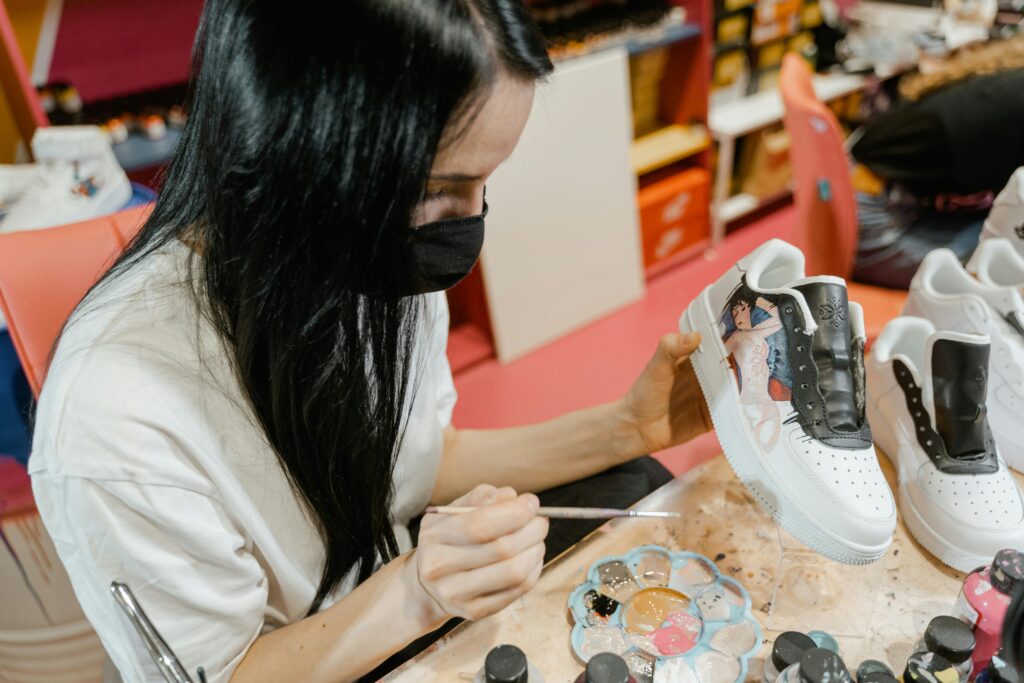1. Shoe Designer
At the core of any footwear workshop is the shoe designer. These creative minds conceptualize and sketch designs to bring unique and trendsetting footwear creations to life. A keen eye for detail, a deep understanding of materials, and a knack for staying ahead of fashion trends are essential skills for a successful shoe designer. From high-end fashion houses to athletic footwear brands, shoe designers play a pivotal role in shaping the aesthetics and functionality of footwear.
2. Footwear Developer
Footwear developers bridge the gap between design and production, ensuring that the envisioned designs are translated into tangible products. They work closely with manufacturers, sourcing materials, overseeing prototyping processes, and managing production timelines. Attention to quality control, cost efficiency, and innovation is crucial for footwear developers to deliver footwear that meets both creative and commercial standards.
3. Production Manager
In a footwear workshop, the production manager is the orchestrator behind the scenes, overseeing the manufacturing process from start to finish. They coordinate with suppliers, manage production schedules, and monitor quality control to ensure that footwear products are produced efficiently and up to standard. Strong organizational skills, problem-solving abilities, and a deep understanding of manufacturing processes are key attributes of a successful production manager.
4. Marketing Coordinator
Marketing coordinators play a vital role in promoting footwear brands and products to target audiences. They develop marketing strategies, coordinate advertising campaigns, and analyze market trends to drive brand visibility and consumer engagement. A solid grasp of digital marketing tools, social media platforms, and consumer behavior is essential for marketing coordinators to create impactful marketing initiatives that resonate with consumers in the competitive footwear market.
5. Retail Buyer
Retail buyers play a crucial role in curating footwear collections for retail stores and online platforms. They analyze sales data, track market trends, and negotiate with suppliers to select the right mix of footwear products that align with consumer preferences and brand positioning. Strong analytical skills, negotiation abilities, and a keen sense of fashion trends are essential for retail buyers to make informed decisions that drive sales and profitability.
6. Brand Strategist
Brand strategists focus on shaping the overall brand identity and market positioning of footwear brands. They conduct market research, develop brand messaging, and create brand positioning strategies to differentiate brands in the competitive market landscape. Brand strategists collaborate with cross-functional teams to ensure brand consistency and alignment with consumer expectations, driving brand loyalty and market growth.
7. Supply Chain Analyst
Supply chain analysts play a critical role in optimizing the supply chain processes of footwear brands, from sourcing raw materials to delivering finished products to consumers. They analyze supply chain data, identify inefficiencies, and implement strategies to streamline operations, reduce costs, and enhance supply chain resilience. Strong analytical skills, attention to detail, and a deep understanding of supply chain dynamics are essential for supply chain analysts to drive operational efficiency and sustainable growth.
8. Trend Forecaster
Trend forecasters anticipate future fashion trends and consumer preferences, providing valuable insights to guide footwear design and marketing decisions. They analyze cultural shifts, runway trends, and consumer behavior to forecast the next big trends in footwear. Trend forecasters play a key role in helping footwear brands stay ahead of the curve, innovate their product offerings, and capture the attention of trend-conscious consumers.
9. Sustainability Specialist
As sustainability becomes a growing concern in the fashion industry, footwear workshops are increasingly focusing on sustainable practices and materials. Sustainability specialists work to implement eco-friendly initiatives, reduce environmental impact, and promote ethical practices in footwear production. They collaborate with suppliers, design teams, and manufacturers to integrate sustainable practices throughout the footwear supply chain, meeting the demands of environmentally conscious consumers.
10. E-Commerce Specialist
With the rise of online shopping, e-commerce specialists play a key role in driving online sales and optimizing the digital presence of footwear brands. They manage e-commerce platforms, implement digital marketing strategies, and analyze online performance metrics to enhance customer engagement and conversion rates. E-commerce specialists leverage data-driven insights and technological tools to create seamless online shopping experiences that drive revenue growth and brand loyalty.
Conclusion
Footwear workshops offer a dynamic and diverse landscape of career opportunities for individuals passionate about footwear design, production, and marketing. By exploring these top 10 roles in the footwear industry, aspiring professionals can gain valuable insights into the skills, responsibilities, and challenges associated with each role.
Whether your passion lies in design, production, marketing, or sustainability, the footwear industry presents various paths for career growth and creativity.
Key Takeaways:
- Footwear workshops provide valuable practical experience across design, production, and marketing in the footwear industry.
- Creativity, collaboration, and attention to market trends are essential for success in footwear careers.
- Strong coordination between design, development, production, and marketing teams ensures seamless product creation.
- Understanding consumer behavior and fashion trends is crucial for driving product appeal and brand relevance.
- Efficient supply chain management and data analysis help optimize production and distribution processes.
- Sustainability and eco-conscious practices are becoming central to modern footwear production and branding.
- Digital marketing and e-commerce strategies are critical for reaching today’s online consumers and growing brand presence.
- Footwear professionals must balance innovation with functionality and consumer expectations.
In the dynamic world of footwear design and marketing, mastering key roles is essential for career growth. Consider exploring the FIT Footwear Business Foundations online course and certificate program by Yellowbrick to enhance your skills and knowledge in the footwear industry.








